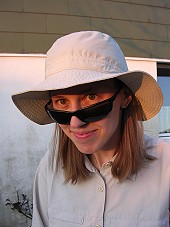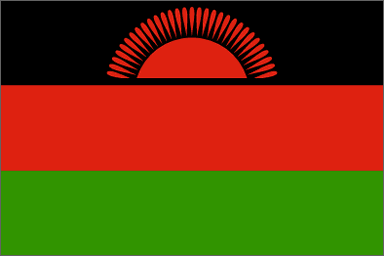
MARTINA'S WORLD TRIP
MALAWI: June 27 - July 15, 2004


(Übersetzungshilfe)
 |
MARTINA'S WORLD TRIP MALAWI: June 27 - July 15, 2004 |
|||||||
 |
||||||||
 |
Your Dictionary
(Übersetzungshilfe) |
|||||||
| Thursday, July 1st, 2004 - Mount Mulanje Day I | ||||||||
| Emily and I got up early to go food shopping in the city centre. We knew that we would have to provide for ourselves on the mountain, so we had to be prepared. Our favourite supermarket was a “Shoprite” store, part of Africa’s largest food retailer, whose branches I had already seen in other countries. You can basically compare them with a Penny Markt (Germany), Delhaize (Belgium) or Carrefour (Spain) and you get most of what you would find in a Western European supermarket too. Back at Doogles after our shopping tour, we re-packed our bags because we only wanted to take with us what we really needed for the hike. We ended up taking my backpack with us to the mountains and leaving Emily’s backpack with our remaining stuff at Doogles, locked away in a storage facility. After all, we didn’t need much but the things we did need (sleeping bags, blankets, warm clothes, food) were quite voluminous. When we were finally ready to leave, it was already around 11:00 am. We had to take a minibus to Limbe, just 6 km south-east of Blantyre and then another one to Chitikali, a small village near Mount Mulanje. The ride took about one and a half hours and was, apart from the tight seating on the buses, quite pleasant. Well, they actually conned us in Limbe, when they dropped us off the first bus at a gas station, telling us there was no real bus stop in this town. On our way back we learned that this was a lie but hey, once again, welcome in Africa... these are the things you have to learn to live with if you want to make it somehow. At least, we found a minibus connection to take us towards Mulanje and that was all we wanted. When we arrived in Chitikali, we spent some time on the local market to complete our food shopping. A tiny village, 90 km away from Blantyre and basically from anything you would remotely associate with civilisation or tourism, Chitikali was really what you could call the “true African experience”. This was a place where white travellers were still a curiosity and where people seemed to live mostly untouched by Western influence (except for the conquest of Coca Cola, of course). Coming here by public transport was an adventure for itself, locals hardly spoke English and the Chitikali market was one of the most authentic I’ve seen on my entire trip. In a maze of wooden stalls and dusty alleyways, men and women offered all sorts of spices, potatoes, onions, tomatoes, rice, mangoes and bananas for sale. Translated prices would be 0,15-0,30 Euro for a decent portion of each - except for carrots which were rare and expensive. The merchandise was weighed on antiquated scales and sold loose. Other stands were loaded with dried fish or fried poultry. The weirdest food we found were fried mice on a stick. Imagine a long wooden stick as the ones used for cotton candy (Zuckerwatte) but instead of cotton candy, there were five to six mice vertically speared up on it. They were in complete pieces, fur, head and tail still intact, except that they looked as if they were wet. A guy explained us that they were thrown into boiling oil and that their bodies, although looking wet and soft, were actually fried and crispy. The mice were eaten as a whole, with the exception of the tail, and were considered a local delicacy. – We had a hard time convincing him that we did NOT want to try them... Emily and I mainly bought fresh fruits and vegetables but we also needed a pan or a similar cooking device to prepare some of the food we had with us. It was a little odyssey to find a shop for pots and pans in Chitikali but finally, we found someone who sold us a small aluminium dish that we could use for cooking. (If anyone of us had had a little more experience in outdoor camping, we probably would have realised that it was not very practical to buy a pot without handle or anything else that could be used to remove it from open fire once the aluminium heated up... well, you live and you learn.) Once we were done with our shopping, we set out for the road that led to Likabula, an even smaller village 10 km further, directly at the foot of Mount Mulanje, from where we would start our hike tomorrow. There was no public transport to Likabula, so we had to wait for a vehicle to give us a lift. This was one of the very few occasions I would hitch-hike and the only reason I agreed to do it, was because I was not alone. Being with Emily was not only fun, it also made me feel safer. After waiting for a while, we got a lift in a small jeep. We were not the only passengers the driver had picked up on the road, so once again it was squeezing in the back of a tiny vehicle. At the end you are expected to pay the driver a little something but this was still the cheapest way – if not the only one – to reach certain places in the middle of nowhere. Hiking on the Mulanje Plateau is controlled by a small Forest Station in Likabula where we went to register and book our nights in the huts on the mountain. We also decided to take a porter for our big backpack whereas we both would carry our small daypacks. The porter would also be useful to guide us through the different paths on the mountain. When we arrived in Likabula, we were quickly surrounded by a group of young men who tried to talk us into hiring them as guides or porters but we preferred to arrange that at the Forest Station where they keep a list of registered people who are known to be reliable. The price for a porter was five dollars a day and in the end, it was totally worth it. Our guy was called Ramson, he was 21 years old, a little shy and from Likabula. We agreed that he would pick us up at 7:00 am tomorrow morning. Since the only available guesthouse was closed, Emily and I spent the night at a self-catering chalet of the nearby CCAP Mission (Church of Central Africa, Presbyterian). It was basically a small house, very simple but clean and surprisingly comfortable with two bedrooms, running water and electricity. Using a lot of imagination and inventive talent, we turned the cooking corner and its little stove into a super productive kitchen. Temporary drawbacks like a 40-minute power cut that left us in complete darkness and no oil to fry the vegetables could not prevent us from preparing a delicious rice-and-vegetable dinner. At first very sceptical how to succeed with only VERY limited tools and basically no spices to flavour the dish, we were both surprised about the outcome of our creative outburst – it was actually very good! After we had feasted until we almost burst, we spent the rest of the evening playing card games. Before going to bed we still arranged with a guy to buy us some Coca Cola for the hike tomorrow. (In case you wonder why we would want to drink coke instead of water, may I remind you that bottled Coca Cola is still the safest beverage to obtain in places where you cannot be sure where your water comes from. Getting hold of reliable potable water was as good as impossible here since it was rarely sold in sealed bottles.) We had to pay him in advance and were almost prepared that he wouldn’t show up anymore after he had taken our money. The more we were positively surprised to find the ordered four bottles in front of our door the next morning. In case you ever come to Likabula – you can trust Gideon with organising the drinks! |
||||||||